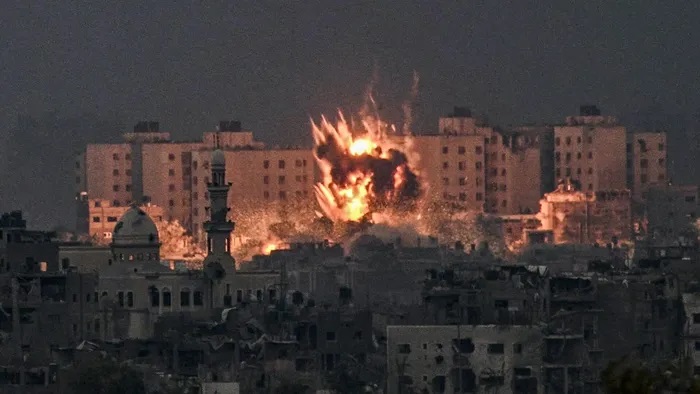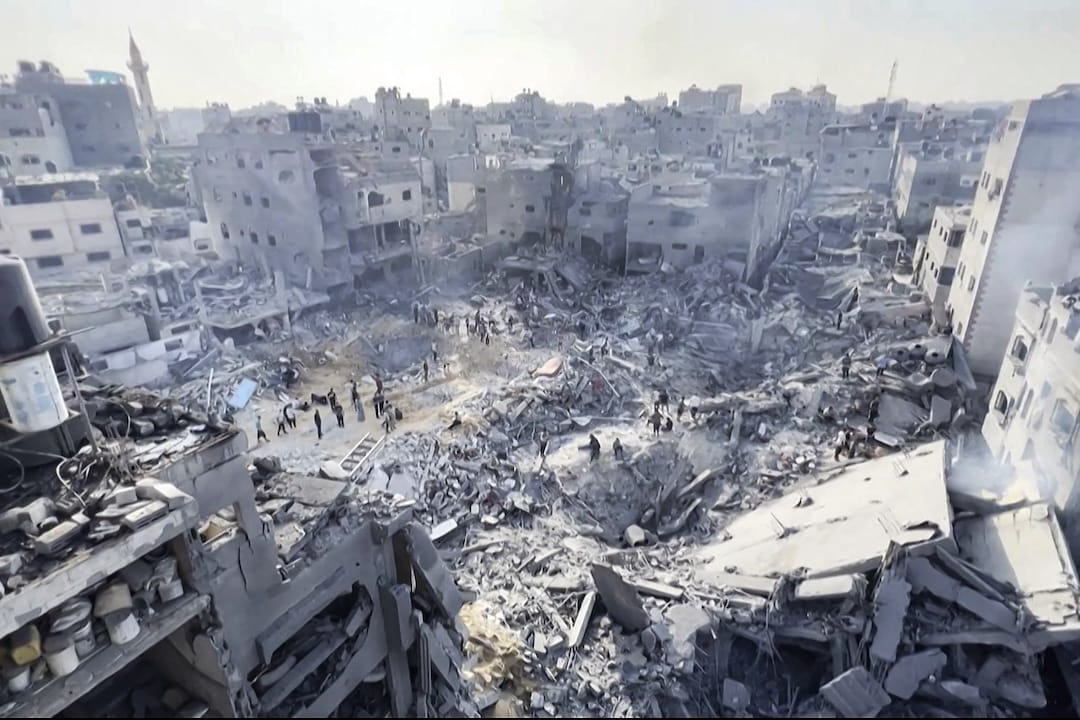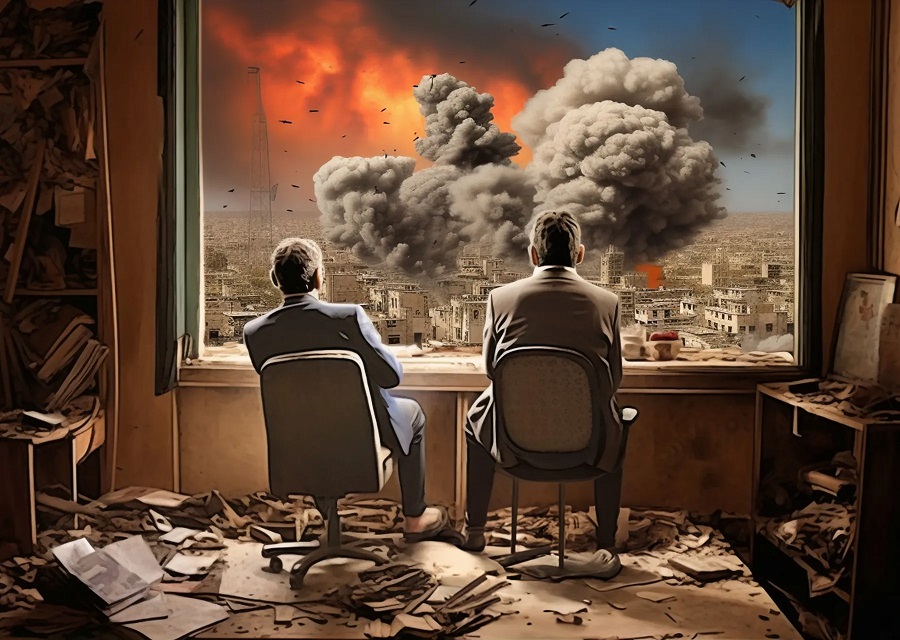
Sana'a - Saba: Abdulaziz Al-Hazi
The barbaric Zionist aggression against the Gaza Strip has revealed the international system's inability to stop the daily massacres and genocide in the region, as well as the contradictions with which major Western countries, especially the United States, operate. These countries raise slogans and values of democracy, respect for freedom, and human rights in various issues and crises, while allowing the Zionist entity to carry out a campaign of genocide against Gaza, providing all forms of material, diplomatic, and military support to the occupying entity.
A simplified definition of the international system is that it is a tool for understanding the power relations between countries of the world and the distribution of this power among them.
The international system is important because it constitutes the environment in which international relations occur. This is crucial when formulating foreign policy, as such policy cannot be established without understanding the surrounding international environment represented by the international system.
From this perspective, it seems that we will witness a fundamental transformation in our world today from a unipolar international system to a multipolar system, as there is a global sentiment among everyone in the world of distrust in the current international system, which is dominated by global Zionist gangs that control the destinies of nations in the form of governments and institutions, etc.
Everyone shares a feeling of distrust in the ability of the United States of America to play the role of global leader after it revealed its ugly face in the Gaza war and its unlimited support for the genocide committed by the Zionist entity, or even to be convinced that it can lead this system again in the foreseeable future.
The occupying Zionist entity has violated all international laws and treaties, whether those it has signed or those imposed on it by international custom, especially international humanitarian law concerning the protection of civilians in armed conflicts.
Among the most prominent legal violations by the Zionist entity in its recent war on Gaza are the violations of Articles 55 and 59 of the Fourth Geneva Convention, which relate to the administration of occupied territories and the necessity for the occupying power to bear the primary responsibility for ensuring the provision of food and medical supplies to the population in the occupied territory. If food or medical supplies are insufficient to meet the needs of the civilian population, all humanitarian and relief operations must be allowed to pass; this is something the Zionist entity has not adhered to, as it deliberately used starvation as a weapon in its retaliatory war on the Gaza Strip, by besieging the area and obstructing the entry of humanitarian and relief aid.
Additionally, there is a violation of Article 33 of the Fourth Geneva Convention, which concerns the prohibition of collective punishment, looting, and inhumane treatment in armed conflicts, as well as the commission of a series of war crimes such as targeting schools and hospitals, and the crime of forced displacement, which is stated in the Rome Statute of the International Criminal Court as a crime against humanity, as mentioned in Article 49 of the Fourth Geneva Convention of 1949, which prohibits the forcible transfer of individuals, whether collectively or individually, or their expulsion from their places of residence to other lands.
The occupying entity voted in the Knesset to prevent the establishment of a Palestinian state; this contradicts the right to self-determination, which is stated in Article 1 of the International Covenant on Civil and Political Rights, which asserts that "all peoples have the right to self-determination."
Experts believe that with every transition from one international system to another, international relations undergo a violent upheaval that imposes a type of dangerous tension in several hotspots. Moreover, it represents the death throes of the unipolar system and the painful birth of a multipolar system.
The Cold War era constituted the golden age of international legitimacy that constantly sought a minimum level of credibility, as this credibility is the primary condition for the limited utilization of the United Nations by one camp or another.
The collapse of the Soviet bloc whetted the appetite of the new victors to redraw the world map according to their interests first, making civil society groups around the world the first opposing force to such a direction.
In-depth discussions have taken place regarding the necessity to enhance the arsenal of the international human rights charter to confront the American policy, which has become primarily concerned with imperial construction rather than the collective organization of international relations. The double standards have become repugnant, and there is no longer any incentive for large segments of the southern countries, in Latin America, Africa, and Asia, to respect what is not respected, to sanctify the profane, and to obey international tyranny in the name of Security Council resolutions. The year 1993 was the peak of these civil and human rights activities, when the Security Council adopted resolutions from the Human Rights Commission related to the establishment of international criminal tribunals for Yugoslavia and Rwanda, the creation of a High Commissioner for Human Rights, and the progress in environmental rights.
In contrast, the United States was preparing to reorganize the global economy based on enhancing its hegemony and consolidating its rules in the Gulf and the Arabian Peninsula. It also established a flexible concept of legitimacy that would allow it to adopt parallel structures to whatever legal and moral rules the Economic and Social Council produces, which do not align with the process of rebuilding the balance of power on a global scale. Additionally, it supported and reinforced the political authorities allied with the United States, regardless of their governing style, whether democratic or authoritarian.
Despite all the announced policies of successive American administrations to this day, the United States preferred to block the path to free popular will, based on the belief that the emergence of a significant public opinion and democratic systems with active civil societies in the Global South poses a real threat to its hegemony project. No matter the state of public opinion in the North, it finds no oddity in the privileges granted to France and Britain in the Security Council, for example.
The war on terrorism was the final blow to international legitimacy as interpreted in the North. Resistance movements were classified in the camp of evil and terrorism, and the most significant expressions of civil movements in Islamic countries (charitable and humanitarian associations) were placed under suspicion.
Thus, our battle today is to strengthen the role of United Nations institutions that have not yet been subordinated to the decisions of the U.S. administration and quasi-governmental organizations that respect the international human rights charter, considering that the human situation does not yet allow for surpassing the United Nations.
Experts believe that in this sense, we see soon the decline of international legitimacy in its current concept, as it no longer represents a true reflection of the collective will on a global scale. In this regard, we also mobilize all energies for a wide-ranging networking of non-governmental spaces, a networking that allows for the emergence of a new legal legitimacy, based on international justice, which is the best that civil societies and the United Nations have produced in the face of the Security Council, held captive by the American administration.
E.M
The barbaric Zionist aggression against the Gaza Strip has revealed the international system's inability to stop the daily massacres and genocide in the region, as well as the contradictions with which major Western countries, especially the United States, operate. These countries raise slogans and values of democracy, respect for freedom, and human rights in various issues and crises, while allowing the Zionist entity to carry out a campaign of genocide against Gaza, providing all forms of material, diplomatic, and military support to the occupying entity.
A simplified definition of the international system is that it is a tool for understanding the power relations between countries of the world and the distribution of this power among them.
The international system is important because it constitutes the environment in which international relations occur. This is crucial when formulating foreign policy, as such policy cannot be established without understanding the surrounding international environment represented by the international system.
From this perspective, it seems that we will witness a fundamental transformation in our world today from a unipolar international system to a multipolar system, as there is a global sentiment among everyone in the world of distrust in the current international system, which is dominated by global Zionist gangs that control the destinies of nations in the form of governments and institutions, etc.
Everyone shares a feeling of distrust in the ability of the United States of America to play the role of global leader after it revealed its ugly face in the Gaza war and its unlimited support for the genocide committed by the Zionist entity, or even to be convinced that it can lead this system again in the foreseeable future.
The occupying Zionist entity has violated all international laws and treaties, whether those it has signed or those imposed on it by international custom, especially international humanitarian law concerning the protection of civilians in armed conflicts.
Among the most prominent legal violations by the Zionist entity in its recent war on Gaza are the violations of Articles 55 and 59 of the Fourth Geneva Convention, which relate to the administration of occupied territories and the necessity for the occupying power to bear the primary responsibility for ensuring the provision of food and medical supplies to the population in the occupied territory. If food or medical supplies are insufficient to meet the needs of the civilian population, all humanitarian and relief operations must be allowed to pass; this is something the Zionist entity has not adhered to, as it deliberately used starvation as a weapon in its retaliatory war on the Gaza Strip, by besieging the area and obstructing the entry of humanitarian and relief aid.
Additionally, there is a violation of Article 33 of the Fourth Geneva Convention, which concerns the prohibition of collective punishment, looting, and inhumane treatment in armed conflicts, as well as the commission of a series of war crimes such as targeting schools and hospitals, and the crime of forced displacement, which is stated in the Rome Statute of the International Criminal Court as a crime against humanity, as mentioned in Article 49 of the Fourth Geneva Convention of 1949, which prohibits the forcible transfer of individuals, whether collectively or individually, or their expulsion from their places of residence to other lands.
The occupying entity voted in the Knesset to prevent the establishment of a Palestinian state; this contradicts the right to self-determination, which is stated in Article 1 of the International Covenant on Civil and Political Rights, which asserts that "all peoples have the right to self-determination."
Experts believe that with every transition from one international system to another, international relations undergo a violent upheaval that imposes a type of dangerous tension in several hotspots. Moreover, it represents the death throes of the unipolar system and the painful birth of a multipolar system.
The Cold War era constituted the golden age of international legitimacy that constantly sought a minimum level of credibility, as this credibility is the primary condition for the limited utilization of the United Nations by one camp or another.
The collapse of the Soviet bloc whetted the appetite of the new victors to redraw the world map according to their interests first, making civil society groups around the world the first opposing force to such a direction.
In-depth discussions have taken place regarding the necessity to enhance the arsenal of the international human rights charter to confront the American policy, which has become primarily concerned with imperial construction rather than the collective organization of international relations. The double standards have become repugnant, and there is no longer any incentive for large segments of the southern countries, in Latin America, Africa, and Asia, to respect what is not respected, to sanctify the profane, and to obey international tyranny in the name of Security Council resolutions. The year 1993 was the peak of these civil and human rights activities, when the Security Council adopted resolutions from the Human Rights Commission related to the establishment of international criminal tribunals for Yugoslavia and Rwanda, the creation of a High Commissioner for Human Rights, and the progress in environmental rights.
In contrast, the United States was preparing to reorganize the global economy based on enhancing its hegemony and consolidating its rules in the Gulf and the Arabian Peninsula. It also established a flexible concept of legitimacy that would allow it to adopt parallel structures to whatever legal and moral rules the Economic and Social Council produces, which do not align with the process of rebuilding the balance of power on a global scale. Additionally, it supported and reinforced the political authorities allied with the United States, regardless of their governing style, whether democratic or authoritarian.
Despite all the announced policies of successive American administrations to this day, the United States preferred to block the path to free popular will, based on the belief that the emergence of a significant public opinion and democratic systems with active civil societies in the Global South poses a real threat to its hegemony project. No matter the state of public opinion in the North, it finds no oddity in the privileges granted to France and Britain in the Security Council, for example.
The war on terrorism was the final blow to international legitimacy as interpreted in the North. Resistance movements were classified in the camp of evil and terrorism, and the most significant expressions of civil movements in Islamic countries (charitable and humanitarian associations) were placed under suspicion.
Thus, our battle today is to strengthen the role of United Nations institutions that have not yet been subordinated to the decisions of the U.S. administration and quasi-governmental organizations that respect the international human rights charter, considering that the human situation does not yet allow for surpassing the United Nations.
Experts believe that in this sense, we see soon the decline of international legitimacy in its current concept, as it no longer represents a true reflection of the collective will on a global scale. In this regard, we also mobilize all energies for a wide-ranging networking of non-governmental spaces, a networking that allows for the emergence of a new legal legitimacy, based on international justice, which is the best that civil societies and the United Nations have produced in the face of the Security Council, held captive by the American administration.
E.M

